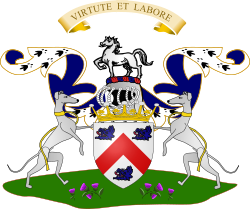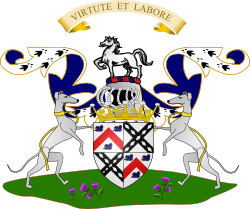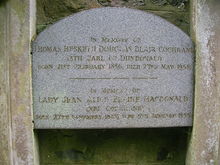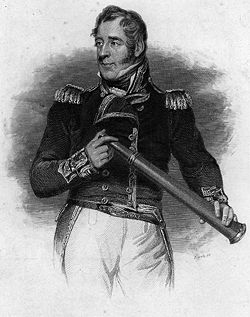- Earl of Dundonald
-
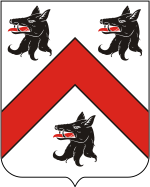 Coat of arms of the Marquess of Maranhão.[2]
Coat of arms of the Marquess of Maranhão.[2]
Earl of Dundonald is a title in the Peerage of Scotland.
The Earldom was created in 1669 for the Scottish soldier and politician William Cochrane, 1st Earl of Dundonald, along with the subsidiary title of Lord Cochrane of Paisley and Ochiltree, with remainder to his heirs male, failing which to his heirs female without division who should bear or assume the name of Cochrane, and in failure thereof to his heirs general. In 1647, he had already been created Lord Cochrane of Dundonald in the Peerage of Scotland, with remainder to the heirs male of his body.[citation needed]
The first Earl was succeeded by his grandson John Cochrane, the second Earl (died 1690). He was the son of William Cochrane, Lord Cochrane (died 1679), eldest son of the 1st Earl. The 2nd Earl was a member of the Scottish Privy Council. On his death the titles passed to his eldest son William Cochrane, the third Earl (died 1705). He died unmarried at an early age and was succeeded by his younger brother John Cochrane, the fourth Earl (died 1720). He sat in the House of Lords as a Scottish Representative Peer from 1713 to 1715. When he died the titles passed to his son William Cochrane, the fifth Earl (died 1725). He died unmarried at the age of sixteen.[citation needed]
On his death the line of the 2nd Earl failed and the titles passed to his first cousin once removed, Thomas Cochrane, the sixth Earl (died 1737). He was the son of William Cochrane (died 1717), second son of the aforementioned William Cochrane, Lord Cochrane (died 1679), eldest son of the 1st Earl. He was succeeded by his son William Cochrane, the seventh Earl (died 1758). He fought in the Seven Years' War and was killed at the Battle of Louisburg in 1758.[citation needed]
On the death of the 7th Earl this line of the family also failed and the titles were inherited by his second cousin once removed, Thomas Cochrane, the eighth Earl (died 1778). He was the grandson of Colonel Sir John Cochrane (died 1707), second son of the 1st Earl. Before he became the 8th Earl, he sat as Member of Parliament (Whig) for Renfrewshire between 1722 and 1727. After his death, the titles passed to his son Archibald Cochrane, the ninth Earl (died 1831). The 9th Earl was a scientist and inventor. When he died the titles passed to his son Thomas Cochrane, the tenth Earl (died 1860). He was a noted naval commander and fought in the Napoleonic Wars. Before inheriting the peerage titles, he also sat as a Member of Parliament. However, he was later imprisoned on a false charge of fraud and expelled from the navy and Parliament. After release he went abroad and commanded the Chilean, Peruvian, Brazilian and Greek navies with distinction.
In 1824, he was created Marquess of Maranhão (Marquês do Maranhão) in the Brazilian nobility, by Emperor Pedro I. He was also awarded the accompanying coat of arms. There are many works which indicate that the Brazilian title and coat of arms was not hereditary[3][4][5][6][7], especially considering the fact that in Brazilian nobilary system many titles used not to be so (although not exclusively).[8][9][10] Nonetheless, the descendants of the 10th Earl preserved the title among themselves.[11]
In 1832 he was reinstated in the Royal Navy and received a royal pardon.[citation needed]
He was succeeded by his son Thomas Cochrane, the eleventh Earl (died 1885). He sat in the House of Lords as a Scottish Representative Peer from 1879 to 1885. On his death the titles passed to his eldest son Douglas Cochrane, the twelfth Earl (died 1935). He was a Lieutenant-General in the Royal Army and a Scottish Representative Peer from 1886 to 1922. He married Winifred Bamford-Hesketh. When he died the titles passed to his son Thomas Hesketh Cochrane, the thirteenth Earl (died 1958). He was a Scottish Representative Peer in the House of Lords from 1941 to 1955. He never married and was succeeded by his nephew Ian Douglas Cochrane, the fourteenth Earl (died 1986). He was the son of Douglas Robert Hesketh Roger Cochrane, second son of the twelfth Earl. The 14th Earl was a Major in the Black Watch. As of 2009 the titles are held by his only son Ian Alexander Cochrane, the fifteenth Earl, who succeeded in 1986. The 15th Earl is Chief of Clan Cochrane.[citation needed]
Several other members of the Cochrane family have also gained distinction: Sir Alexander Cochrane, sixth son of the 8th Earl, was an Admiral in the Royal Navy. His son Sir Thomas John Cochrane was also a naval commander and served as Governor of Newfoundland. His son Alexander Cochrane-Baillie was a Conservative politician and was created Baron Lamington in 1880 (see this title for more information). William Francis Dundonald Cochrane (1847–1927), a Brigadier-General in the Army, was the son of William Marshall Cochrane, a Colonel in the Army, son of Major the William Erskine Cochrane, third son of the ninth Earl. Archibald Cochrane, fourth son of the 9th Earl, was a Captain in the Royal Navy. His grandson Basil Edward Cochrane was a Vice-Admiral in the Royal Navy. He was the father of Archibald Cochrane (1847–1952) and Sir Edward Owen Cochrane (1881–1972), both Rear-Admirals in the Royal Navy. John Dundas Cochrane, another younger son of the ninth Earl, was a traveller and explorer. Thomas Cochrane, second son of the 11th Earl, was a politician and was created Baron Cochrane of Cults in 1919 (see this title for more information).
The earldom is named after Dundonald, South Ayrshire (see Dundonald Castle). The family seats are Lochnell Castle, near Oban, Argyll and Bute, and Beacon Hall, near Cranbrook, Kent, England.
The Earl of Dundonald is the Scottish clan chief of Clan Cochrane.
Earls of Dundonald (1669); Marquess of Maranhão (1824)
- William Cochrane, 1st Earl of Dundonald (d. 1685)
- John Cochrane, 2nd Earl of Dundonald (c. 1660–1690)
- William Cochrane, 3rd Earl of Dundonald (1686–1705)
- John Cochrane, 4th Earl of Dundonald (1687–1720)
- William Cochrane, 5th Earl of Dundonald (1708–1725)
- Thomas Cochrane, 6th Earl of Dundonald (1702–1737)
- William Cochrane, 7th Earl of Dundonald (1729–1758)
- Thomas Cochrane, 8th Earl of Dundonald (1691–1778)
- Archibald Cochrane, 9th Earl of Dundonald (1749–1831)
- Thomas Cochrane, 10th Earl of Dundonald, Marquess of Maranhão (1775–1860)
- Thomas Barnes Cochrane, 11th Earl of Dundonald (1814–1885)
- Douglas Cochrane, 12th Earl of Dundonald (1852–1935)
- Thomas Cochrane, 13th Earl of Dundonald (1886–1958)
- Iain Douglas Leonard Cochrane, 14th Earl of Dundonald (1918–1986)
- Iain Alexander Douglas Blair Cochrane, 15th Earl of Dundonald (born 1961).[12]
The Heir Apparent is the present holder's eldest son Archibald Iain Thomas Blair Cochrane, Lord Cochrane (born 1991). The next in line is the present holder's second son Hon. James Douglas Richard Cochrane (born 1995)
See also
- Clan Cochrane
- Baron Lamington
- Baron Cochrane of Cults
- Cochrane (surname)
- Auchans, Ayrshire
References
- ^ The Scots peerage: founded on Wood's ed. of Sir Robert Douglas's Peerage of Scotland; containing an historical and genealogical account of the nobility of that kingdom; p. 368; by Paul, James Balfour, Sir, 1846-1931; Edinburgh: D. Douglas; Not in copyright
- ^ VASCONCELOS, Jaime Smith & VASCONCELOS, Rodolfo Smith. Archivo Nobiliarchico Brasileiro. Lausanne, 1918.
- ^ Archivo Nobiliarchico Brazileiro (1918)
- ^ A Nobreza de A a Z – Archivo Nobiliarchico Brazileiro with corrections
- ^ GeneAll
- ^ Carlos Eduardo Barata & AH Cunha Bueno. Dicionário das Famílias Brasileiras, articles: Maranhão, Marquês; família Cochrane.
- ^ Almanak Laemmert (1889)
- ^ [1]
- ^ As barbas do imperador (ISBN 85-7164-837-9): pages 166, 177, 180, 192
- ^ Heráldica (ISBN 86-2295)
- ^ Burke's Peerage
- ^ burkes-peerage.net
- Kidd, Charles, Williamson, David (editors). Debrett's Peerage and Baronetage (1990 edition). New York: St Martin's Press, 1990.
- Leigh Rayment's Peerage Pages
- www.thepeerage.com
Categories:- Earldoms in the Peerage of Scotland
- Earldoms
- Lists of Scottish people
Wikimedia Foundation. 2010.

